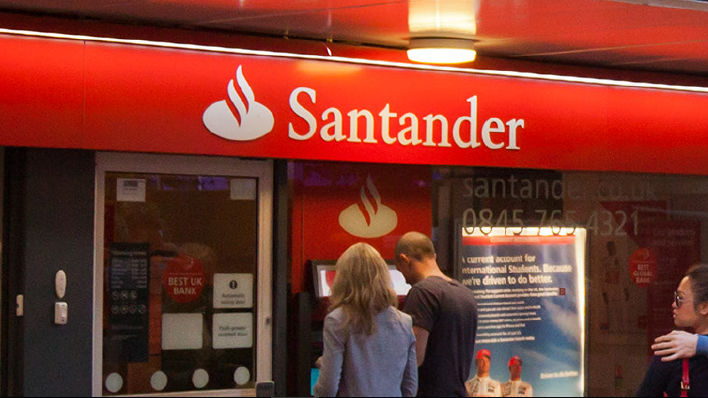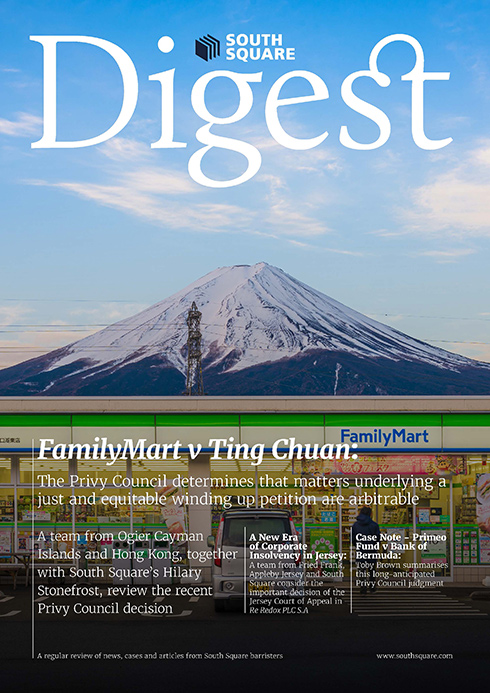

Clara Johnson discusses the recent decision of the Commercial Court.
Click here to read the full article.
The insolvency of Marme Inversiones 2007 S.L.U (“Marme”) in 2014 has brought much varied and interesting litigation to this jurisdiction. The most recent case is no exception. In ING Bank N.V. & Anor v. Banco Santander S.A. [2020] EWHC 3561 (Comm) Mrs Justice Cockerill had to decide whether the English court had jurisdiction to hear the claim brought by ING, or whether, as contended by Santander, it could only be brought in the Spanish Insolvency Court as ancillary proceedings in Marme’s liquidation.
This involved the examination of two issues: (1) whether Santander was bound by an exclusive jurisdiction clause entitling ING to rely upon Article 25 of the Brussels Recast Regulation (Regulation (EU) No 1215/2012) as founding the jurisdiction of the English court, and (2) whether the claim was nonetheless excluded from the scope of the Brussels Recast Regulation under Article 1(2) (b) because it concerned “proceedings relating to the winding-up of insolvent companies or other legal persons, judicial arrangements, compositions and analogous proceedings” and therefore fell within the scope of the Insolvency Regulation (Regulation (EC) No 1346/2000).
Background
In 2008 a syndicate of eight lenders, including ING, entered into a loan facility for €1.5 billion and related swap agreements with Marme, to finance the acquisition of the Ciudad Financiera, Santander’s headquarters located just outside Madrid. The loan agreement and the swap agreements (the latter in ISDA Master Agreement form (the “Marme Agreements”) contained exclusive jurisdiction clauses in favour of the English Courts.
In March 2014, shortly after the loan and interest fell due, Marme entered into a voluntary insolvency process in Spain. As part of the insolvency procedure, a Liquidation Plan was approved by the Spanish court and a tender process commenced for the acquisition of Marme’s assets, i.e. the Ciudad Financiera, and its liabilities. Sorlinda Investments S.L.U. (“Sorlinda”) was the successful bidder. As part of itsbid, Sorlinda agreed to assume Marme’s contingent and non-contingent liabilities, which included sums due to ING under the Marme Agreements.
Sorlinda took the position that as a result of two rulings by the Spanish Supreme Court concerning the recognition and accrual of interest on secured loans after the opening of Spanish insolvency proceedings, the interest due under the Marme Agreements had not properly accrued and was not payable by Sorlinda. In December 2019, Sorlinda issued ancillary insolvency proceedings in the Spanish Insolvency Court seeking declarations as to the entitlement of ING to retain interest paid under the loan agreement and to be paid interest under the swap agreement.
On 2 January 2020, Sorlinda merged into Santander. In February 2020, ING issued proceedings in the English High Court against Santander for payment of outstanding swap interest and a declaration that it was entitled to retain the loan interest, relying on the exclusive jurisdiction clauses in the Marme Agreements. The relief sought by ING mirrored the relief sought by Sorlinda in the ancillary proceedings.
Effect of the Marme Agreements
The parties disagreed on the meaning and effect of the assumption by Sorlinda of Marme’s liabilities: Santander’s position was that Sorlinda had agreed with the Insolvency Receiver to provide sufficient funds to pay Marme’s insolvency liabilities as the consideration for the transfer of the Ciudad Financiera. ING argued Sorlinda had assumed a direct liability to Marme’s creditors.
The Court received expert evidence on the scope and effect of the assumption of liabilities under Spanish law in the context of Marme’s liquidation. The experts agreed that there had been no novation of the Marme Agreements, but disagreed as to whether there had been a succession of or assumption of direct liability under the Marme Agreements.
Whilst acknowledging that both perspectives were arguable, Mrs Justice Cockerill preferred the analysis of Santander’s expert, Professor Virgós (co-author of the Virgós-Schmit Report, a key document in the legislative history of the Insolvency Regulation and often referred to by European Courts), that in the absence of clear and unequivocal consent of all Marme’s creditors amongst other factors, Sorlinda had not become directly liable to ING under the Marme Agreements. The actual effect was that Sorlinda had assumed a commitment to the Marme Insolvency Administrator to pay sums to enable Marme’s liabilities in the insolvency to be discharged.
The Jurisdiction Clause
The primary ground of Santander’s application was that ING could not rely on Article 25 of the Recast Brussels Regulation because Santander was not a party to the Marme Agreements containing the exclusive jurisdiction clauses on which ING relied, and did not otherwise agree to be bound by them.
It was common ground that because the governing law of the Marme Agreements was English law, the question of whether Santander was bound by the exclusive jurisdiction clause was to be determined by English law. It was further agreed that because the Marme Agreements prohibited transfer or assignment without the consent of all lenders, there was no novation under English law.
ING sought to argue that this situation fell within a line of cases concerning transfers of obligations in bills of lading cases, starting with the Tilly Russ [1985] 1 QB 931, so that Santander was bound by the exclusive jurisdiction clause in the Marme Agreements notwithstanding that it had not signed or accepted it. ING argued that if as a matter of fact a transfer of the rights and obligations of the Marme Agreement had taken place, then the English law should treat that as succession under English law. ING invited the Court to accept this latter submission notwithstanding that neither English law nor Spanish law provided that succession of those obligations had taken place.
The Court rejected ING’s arguments on this point, finding that the Tilly Russ line of authority was indeed restricted to bills of lading; and that considering whether a de facto succession had taken place went beyond the rule which requires jurisdiction to be determined by the relevant national law.
The Insolvency Regulation/ Brussels Regulation Dichotomy
Although the Court’s finding in relation to Article 25 was sufficient to determine the application, the Judge nonetheless considered whether the Court’s jurisdiction over ING’s claim was to be characterised as a civil and commercial matter under the Brussels Recast Regulation, or whether it was excluded from the scope under Article 1(2)(b) as “proceedings relating to the winding-up of insolvent companies or other legal persons, judicial arrangements, compositions and analogous proceedings”. If it was excluded, it was common ground that it fell under the Insolvency Regulation.
ING argued the matter fell under the Brussels regime: although Santander’s rights and obligations originated in Marme’s insolvency, now those rights had been assumed there was no longer any relevant link to the winding up, so Santander’s position was analogous to a third party who had taken assignment of a claim. ING relied on, inter alia the case of F-Tex SIA v. Lietuvos-Anglijos UAB Jadecloud-Vilma [2013] Bus. L.R. 232 [18] to [51], in which an insolvent German company had made a pre-liquidation transfer to a third party in Lithuania.
Santander’s position was that the case fell squarely under the Insolvency Regulation. First and foremost, the relief sought by ING concerned ‘core matters’ in the insolvency proceedings, namely, the conduct, course and effect of the insolvency proceedings which were all subject to the supervision, control and determination of the Spanish court. Alternatively, the relief amounted to an ‘ancillary matter’ and was an action which derived directly from and was closely connected to Marme’s liquidation. In that context, it argued that the decisive factor was the legal basis of the action and whether it had its source in ordinary rules of civil and commercial law or in derogating rules specific to insolvency, relying on Nickel & Goeldner Spedition GmbH v “Kintra” UAB (Case C-157/13) [2015] QB 96 at [27] and Tünkers France v Expert France (Case C-641/16) [2018] I.L.Pr. 7 at [22].
The Judge accepted that fairly compelling cases could be made for both analyses but considered that she had to approach the issue in two stages.
The first was to ask what is the legal basis of the claim – is it derived directly from the insolvency, and how closely connected is it with the insolvency? The Judge looked to the formulation of ING’s claim in the pleadings, which explicitly raised the issue of Sorlinda’s liability to all of Marme’s creditors, the Spanish insolvency proceedings, and to the Liquidation Plan. She determined that the legal basis of ING’s claim was inextricably a part of the assumption of liabilities which made Sorlinda (subsequently Santander),liable to ING and (on ING’s case) a party to the Marme Agreements.
The second stage was to review that analysis in light of established case law. The Judge found this case was distinguishable to the cases relied on by ING. It was accepted that similar points could be made to those in F-Tex, but in this case the link to insolvency was plainly closer, and unlike F-Tex the dispute could not be detached from the insolvency event. In this case, it could be established that there was a direct and close link to the insolvency process – albeit a more complex one than in the cases considered.
Accordingly, the claim was excluded from the Brussels regime, and jurisdiction determined by the Insolvency Regulation. The Court accordingly granted the declaration that it had no jurisdiction to hear the claim.
Comment
The Judge’s reasons for declaring that the Court had no jurisdiction to hear the claim were, on both issues, consistent with well-established European and domestic jurisprudence. In relation to the second issue, as the Judge noted, compelling arguments could be made for both analyses. Indeed, in many cases there will be a fine line between the Brussels Recast Regulation and the Insolvency Regulation. This decision serves as a reminder that in cases where there are factors pointing in both directions, a weighty factor will be the legal basis of the action and whether it has its source in ordinary rules of civil and commercial law or in derogating rules specific to insolvency.
Credits:
Robin Dicker QC and Clara Johnson acted for Banco Santander SA
Felicity Toube QC and Marcus Haywood acted for ING Bank NV







![Brake & Anor v The Chedington Court Estate Ltd [2023] UKSC 29](https://southsquare.com/wp-content/uploads/2024/02/Brake-Anor-scaled-e1728649908896.jpeg)









